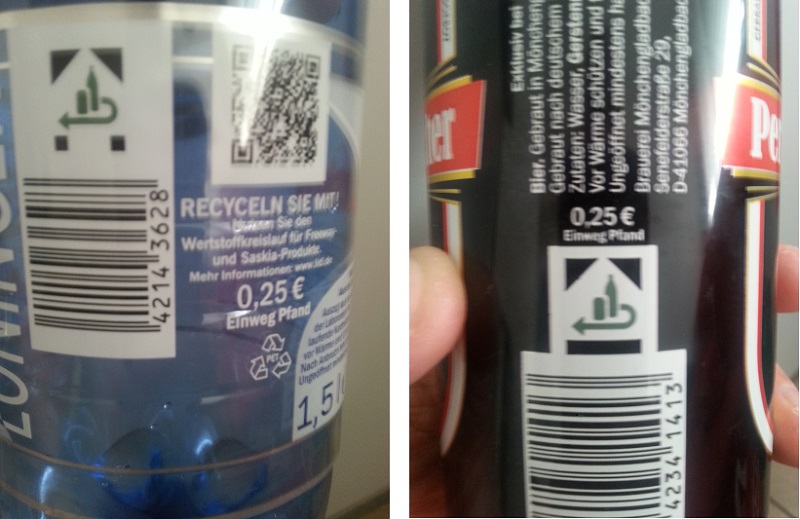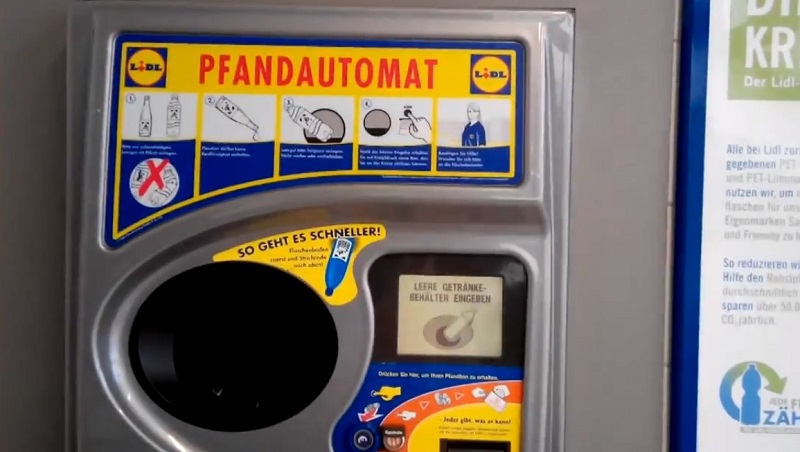Like many people, when I arrived in Germany I knew nothing about the German pfand system or reverse vending machines. I’d been living in the country for two weeks before I realised my mistake and by that time I’d already thrown away quite a bit of money.
I woke up to the situation on a Friday afternoon after a quick visit to the local Lidl supermarket. I’d only bought two bottles of mineral water and a few cans of cheap lager. The mineral water cost 19 cents per (1.5L) bottle. The lager cost 29 cents per (500ml) tin. This should have been a cheap shopping trip and it was. However, I still felt I’d paid slightly more than I should and, as I scrutinized my receipt, I saw the word “pfand” showed up a lot and each time it did so it cost me 25 cents.
The word “pfand” translates to “deposit” and in some cases, the deposit payable for a can or bottle can be more than the cost of the drink that’s inside. So, if your visiting the country and planning on using any of the supermarkets it’s important to know how the German pfand system works.
How to Find Out If You’ve Paid a Deposit on a Bottle or Can
Apart from looking at your receipt, the easiest way to find out if you have paid a pfand is to look on the bottle or can. If you’ve paid this kind of deposit there will be a symbol similar to the one in the picture below and somewhere in close proximity to the symbol there should be a disclosure about how much you have paid.

How to Reclaim Your Deposit
Most of the big supermarkets including Lidl, Netto, and Aldi have one or more reverse vending machines (pfandautomats). They are usually located inside the main entrance. You simply feed your bottles and tins into the machine, it scans them, keeps a tally of the value, and then shoots out a ticket for you to give to the cashier when you pay for your groceries.
German reverse vending machines are pretty simple to use. The most frustrating part of the process is likely to be standing in the queue for the machine and waiting your turn. When you arrive at the machine, there is nothing special you need to do. The whole process is automated. As soon as you pop your bottle or can into the hole, the conveyor belts iside set the bottle spinning, so the machine can locate and scan the relevant code. If it cannot find the code or is unable to read it, the conveyors toss the offending item back to the front of the hole to let you know there is a problem. However, all being well, the conveyors will carry the item away and register a 25 cent credit on the small screen at the side of the machine. After you have finished adding all your cans and bottles it’s just a case of pressing a button near the screen and the machine will issue you with a ticket that states how much money you are owed. You can use it to pay for groceries. If the value of the ticket is more than the value of your grocery bill, the cashier will pay you the difference in cash.
Not surprisingly the default language used on German reverse vending machines is German, but several other language options are available, including English, and it’s easy to change the language on the small display screen. It’s just a case of pressing one of the buttons near the screen. This generally shows a German flag, so it’s easy to spot. It’s best to change the language before putting any bottles or cans into the machine.
Does the German Pfand System Work?
The German pfand system appears to work very well. Nobody likes to throw away money so it’s a good way to encourage a responsible attitude about recycling. As an added bonus, it probably helps keep the German streets and countryside clean. In the UK and many other countries that do not have such a system, a lot of the litter you see on the streets and thrown into the hedges at the side of the road consists of plastic bottles and tin cans. Although it’s likely some plastic bottles and tin cans are still discarded in Germany, the poor and homeless people appear to snap them up and cash them in to supplement their incomes.
– – – – –
– – –
– – –
– – – – –
